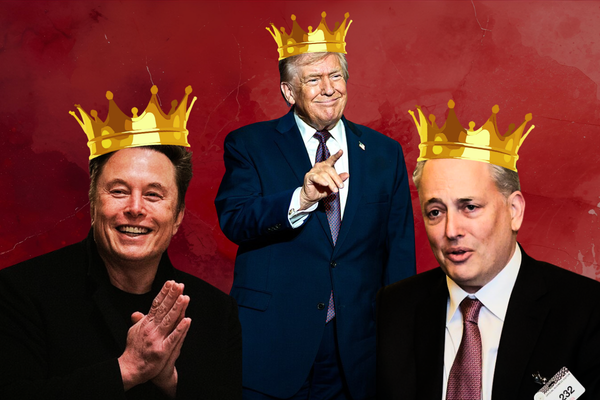Issue 83 – Trump’s crypto-backed plan to auction off access to the White House
Trump’s crypto conflicts continue to multiply as Democratic legislators demand ethics inquiries and block industry-backed bills


President Trump’s cryptocurrency-based self-enrichment continued this week with a $1.5 million-per-plate crypto fundraiser, a $2 billion UAE investment deal using Trump’s new stablecoin, and a naked attempt at influence-buying by a transportation company through Trump’s memecoin. Three major crypto schemes in a single week underscore how aggressively Trump is leveraging the presidency for illegal personal gain.
The blatant corruption is beginning to incur some political consequences, and Senator Richard Blumenthal (D-CT) has opened a preliminary investigation by the Senate Homeland Security Permanent Subcommittee on Investigations into Trump’s World Liberty Financial and memecoin projects. Letters are flying out of Democratic Congresspeople demanding information from various Trump businesses and crypto connections. And even some Trump allies and staunch crypto advocates like Senator Cynthia Lummis have been forced to admit that Trump’s crypto activities “give [her] pause.”1
In the White House
After dismissing as FUD the Wall Street Journal’s report that he was seeking a pardon [I79],2 former Binance CEO Changpeng Zhao is seeking a pardon.3 He served four months in prison after pleading guilty to Bank Secrecy Act violations pertaining to Binance’s lacking anti-money laundering program.
Trump business interests
Trump’s crypto-related conflicts are only growing, and on May 5 the president hosted a $1.5 million-a-plate “Crypto & AI Innovators” fundraising dinner benefiting the MAGA, Inc. super PAC. The dinner, featuring the Trump administration’s “Crypto & AI Czar” David Sacks as a special guest, is distinct from the May 22 dinner for the top 220 buyers of Trump’s memecoin.
While MAGA, Inc. is a single-candidate super PAC that raised over $400 million to support Trump in the 2024 election, the purpose of its fundraising now that he’s in office is unclear. The super PAC’s website hasn’t been updated since the election, still stating that the committee’s “mission is to ensure a second Trump administration and to promote America First candidates”. Despite the somewhat broad mission, the super PAC only spent money to support Trump last election.4 As a second-term president, Trump is Constitutionally prohibited from seeking a third term, though this hasn’t stopped him from musing about possible ways to do so, and the Trump Organization recently began selling a “Trump 2028” hat and “rewrite the rules” merchandise.5
Regarding the memecoin dinner, Democratic Senators Adam Schiff (CA) and Elizabeth Warren (MA) have demanded the Office of Government Ethics open a probe into the stunt.6 The OGE is currently headed by Acting Director and Trump loyalist Jamieson Greer. Another group of Democratic Senators, including Warren, Van Hollen (MD), and Blumenthal (CT) have demanded answers from Treasury Secretary Scott Bessent and Attorney General Pam Bondi about Trump’s business connections to Binance and Binance’s regulatory compliance.7 Separately, Senator Blumenthal, the Ranking Member of the Senate Homeland Security Permanent Subcommittee on Investigations, announced a preliminary inquiry into “Trump’s crypto-backed plan to auction off access to the White House.”8 He sent letters to Fight Fight Fight LLC, one of the entities behind the $TRUMP token, and World Liberty Financial, requesting communications records and other information.910 Preliminary inquiries can include interviews, subpoenas, and depositions, and are concluded with a committee vote to dismiss the matter, issuance of a letter of admonition, or the opening of an adjudicatory review.11
Onstage in Dubai with shady crypto billionaire Justin Sun [I71], President Trump’s son Eric and World Liberty Financial co-founder Zach Witkoff announced that the state-backed Emirati investment firm MGX would be taking a $2 billion stake in the Binance cryptocurrency exchange, using the World Liberty-issued USD1 stablecoin to complete the transaction. USD1 is a brand new stablecoin, and there’s little reason to use the unproven token over a traditional financial transfer or more established stablecoin other than to cozy up to the Trumps. World Liberty Financial, the Trump venture that issues USD1, profits from deals like this by earning yield on the stablecoin’s backing assets, which function essentially as an interest-free loan to the Trumps. “Virtually every detail of [the] announcement ... contained a conflict of interest,” observed the New York Times.12

Texas transportation firm Freight Technologies Inc. said the quiet part out loud when they announced they would issue bonds to fund the acquisition of up to $20 million in the $TRUMP memecoin as an “effective way to advocate for fair, balanced, and free trade between Mexico and the US”.13 The $TRUMP memecoin social media account amplified the press release.14 Federal bribery statutes prohibit the president from accepting payments for influence over official acts.15
Trump’s Truth Social platform told shareholders they are “exploring the introduction of a utility token with a Truth digital wallet that can initially be used to pay for Truth+ subscription costs, and later be applied to other products and services in the Truth ecosphere.” This follows announcements that they plan to partner with Crypto.com to launch a series of crypto- and traditional asset-based ETFs.16 Trump owns a majority stake in the company, which forms a substantial part of his personal fortune (at least on paper) [I81].
Movement Labs, a crypto platform backed by Trump’s World Liberty Financial, is embroiled in scandal after co-founder Rushi Manche made secret, shady deals with market makers that ultimately allowed an outside party to dump $38 million in tokens on retail investors. The blowup resulted in Binance delisting the $MOVE token and banning a related market maker, Movement firing Manche, and the company quickly establishing a new company called Move Industries in hopes of making a “clean break” from the disaster.171819 World Liberty’s token swap deals with Movement and other crypto firms had already been controversial, with allegations of insider trading and quid pro quo deals [I76, Crypto empire].
Having just created the American Bitcoin mining company through a sweetheart deal with Hut8 [I81], Trump’s sons’ company will now merge with Gryphon Digital Mining to go public.20
In the courts
Alex Mashinsky has been sentenced to twelve years in prison for his Celsius fraud, which culminated in the mid-2022 collapse of the US-based cryptocurrency lending firm, causing over half a billion dollars in customer losses [I82, 71]. The government had requested a 20-year sentence; Mashinsky asked for just a single year of imprisonment. Mashinsky pleaded guilty to fraud in December, just before his case was set to go to trial, and that plea was a major factor in his receiving a substantially shorter sentence than Sam Bankman-Fried’s 25 years.

Avi Eisenberg has been sentenced to four years and four months in prison for possession of child sexual abuse material, a crime that was discovered during a law enforcement search of his devices while investigating his $110 million exploit of the Mango Markets cryptocurrency platform [W3IGG, I6, 43, 55, 56, 67, 81]. The judge declined to impose a sentence for the crypto crime, citing the defense’s request for an acquittal or retrial, but noted that the majority of Eisenberg’s sentence would likely stem from the CSAM conviction regardless.21
The criminal trial against former SafeMoon CEO John Karony has begun in the Eastern District of New York, with prosecutors already launching into key testimony from cooperating witness and former SafeMoon CTO, Thomas “Papa” Smith. Smith was the second of three executives charged in November 2023 with conspiracy to commit securities fraud, wire fraud, and money laundering, and he pleaded guilty. The third executive, Kyle Nagy, is still in the wind. Karony argues that because SafeMoon investors could theoretically have traced public blockchain transactions to observe that he and others were draining money from the liquidity pools, it wasn’t fraud (despite their representations that the pool was locked). For detailed coverage, David Z. Morris is there in person covering the trial for Protos, his Dark Markets newsletter, and on social media.
Alexander Gurevich, accused of crafting the August 2022 exploit that enabled a $190 million theft from the Nomad bridge [W3IGG], has been arrested in Israel and is in the process of being extradited to the United States. Although Gurevich was the first to identify the vulnerability, he’s only accused of stealing about $3 million; the remaining amount was stolen in a mad scramble of copycats replicating his exploit. He was reportedly arrested at the Tel Aviv airport en route to Russia, where he has dual citizenship, and was attempting to travel under a different identity after changing his name the prior week.22
Shaquille O’Neal has agreed to an undisclosed settlement with FTX investors over his promotion of the collapsed exchange, ending a saga that I can thank for several months of entertainment back in 2023 as one of the physically largest men in the world managed to hide from process servers.23

Samourai Wallet
Prosecutors who filed charges a year ago against the operators of Samourai Wallet [I56, 57, 67] have joined the defense in requesting a pause in the case “while the Government determines its position” on a request to dismiss the case based on Deputy Attorney General Todd Blanche’s “Memorandum on Ending Regulation by Prosecution” [I81].24 The memo directed the Justice Department “not [to] charge regulatory violations in cases involving digital assets … unless there is evidence that the defendant knew of the licensing or registration requirement at issue and violated such a requirement willfully”.25 The Samourai Wallet defendants are charged with conspiracy to operate an unlicensed money transmitting business — one of the violations Blanche instructed prosecutors not to charge — but also with money laundering conspiracy.26
After the joint request, the defense also submitted a letter accusing prosecutors of improperly suppressing evidence that “senior representatives” at FinCEN believed Samourai Wallet didn’t function as a money services business. “It’s hard to imagine a clearer example of ‘regulation by prosecution’ than what we have here: The relevant regulator telling the prosecutors that Samourai Wallet was not a money transmitter — under the same public guidance that Mr. Rodriguez and Mr. Hill relied on to guide their conduct — and the prosecutors going ahead and indicting them for operating an unlicensed money services business anyway,” wrote the defense team. They have asked the judge to hold a hearing regarding the late disclosure, which they argue was a Brady violation that could have influenced the Magistrate Judge’s bail determinations and Judge Berman’s decision not to allow the defendants to file a motion to dismiss immediately after their arraignment.27
The government replied to characterize the call described in the disclosure as merely “FinCEN employees express[ing] their individual, informal, and caveated opinion”, writing that “the individual employees of FinCEN were not speaking on behalf of FinCEN, they were not providing FinCEN’s opinion, and they ‘did not have a sense of what FinCen would decide if this question were presented to their FinCen policy committee.’” Prosecutors also argue the evidence was provided in a sufficiently timely fashion for the defense team to use in the trial, which is not scheduled for another seven months.28
In regulators
The CFTC has dropped its appeal of a September 2024 decision that found the regulator had overstepped when they blocked Kalshi, a non-crypto-based prediction markets company, from offering betting markets on US elections [I66].2930 President Trump’s son, Donald Trump Jr., joined Kalshi as a senior adviser in January 2025.
FinCEN has designated the Cambodian Huione marketplace and payment services provider a “primary money laundering concern”. Last year, blockchain research firm Elliptic reported that the firm enabled romance scams and other illicit activity [I62]. The Treasury Department seems to agree, with Treasury Secretary Scott Bessent adding that “Huione Group has established itself as the marketplace of choice for malicious cyber actors like the DPRK and criminal syndicates, who have stolen billions of dollars from everyday Americans”.31
SEC
The cryptocurrency lending platform Nexo exited the United States in 2022, amid increased scrutiny from regulators towards crypto lending firms in general following the catastrophic collapse of companies including Celsius, BlockFi, and Voyager. The firm faced significant regulatory actions in the United States, including from the Securities and Exchange Commission, Consumer Financial Protection Bureau, and eight state regulators [W3IGG]. Nexo ultimately settled with the SEC and state regulators for $45 million in January 2023 [W3IGG].
Now, with the SEC defanged, Nexo is ready to make its comeback. At an event Nexo hosted in its native Bulgaria, titled “Trump Business Vision 2025” and featuring Donald Trump Jr. as a headline speaker, Nexo announced their return to the US for both retail and institutional investors with “high-yield crypto savings accounts, asset-backed credit lines, advanced trading, and institutional-grade liquidity solutions”.32 They added, “Thanks to the vision and leadership of President Donald J. Trump, his administration, and his family, the United States is once again a place where innovation is championed, not stifled.”33
Nexo is only one of several cryptocurrency lenders returning to the business after the SEC cracked down on the practice. Coinbase reopened its lending product in January, before Trump even took office, offering retail customers loans against their bitcoin and suggesting using them to pay mortgages or buy cars [I74]. Bitcoin payments app Strike has also recently launched a lending product, shocking some with predatory loan terms combining a 12% interest rate, 2× collateralization,a and the high risk of liquidation if the notoriously volatile asset’s price dips. When asked if Strike rehypothecates the collateral — that is, re-lends the assets taken as collateral (a practice that has contributed to crypto meltdowns in the past) — Strike CEO Jack Mallers was cagey, claiming that company statements suggesting rehypothecation were “more of a legal technicality than operational reality”. In other words: “Don’t worry that our terms allow us to engage in high-risk lending practices, we pinky swear we won’t.”34
Adding to a long list of dropped lawsuits and investigations, the SEC has closed an investigation into PayPal’s stablecoin offering, PYUSD. The agency had previously issued a subpoena to PayPal regarding the stablecoin in November 2023.35
In Congress
GENIUS Act
The GENIUS Act stablecoin bill has failed, for now, to advance in the Senate after all Democrats and two Republicans voted against it. The bill seeks to establish a regulatory framework for stablecoins, defining the entities permitted to issue them, establishing registration paths, and outlining oversight requirements. Critics raised concerns that the bill doesn’t adequately prevent money laundering, ensure consumer protections, restrict tech megagiants from expanding existing monopolies into the banking sector, or limit contagion risk to the financial system.
Democratic opposition to the bill dramatically intensified after Trump’s World Liberty Financial announced the launch of its USD1 stablecoin, then announced it would be the vehicle for the $2 billion MGX/Binance transaction.
Senator Merkley (D-OR) and eighteen other Senators, including crypto advocates and GENIUS Act co-sponsors Gillibrand (D-NY) and Alsobrooks (D-MD), introduced the “End Crypto Corruption Act” to prohibit the president, Congresspeople, and other officials from issuing, sponsoring, or endorsing cryptocurrencies, including stablecoins or memecoins. I have to say, it seems wild to me to acknowledge that Trump is abusing his office in blatantly corrupt ways and respond by... introducing a bill to chip away at the types of corruption he’s engaging in, rather than addressing it directly through impeachment.
Some Democrats cited corruption as their reason for opposing the bill. Others, like crypto-backed Ruben Gallego (D-AZ), said they merely opposed it because the vote was premature, and they hadn’t reviewed a final version with Democrat-negotiated amendments.36 The two Republicans who voted against the bill were Josh Hawley (MO) and Rand Paul (KY). Hawley said he wanted prohibitions against big tech firms issuing stablecoins;37 Paul’s concerns were rooted in fears that the regulations might stifle the crypto industry.38 Majority leader John Thune (R-SD) switched his vote to oppose the bill for procedural reasons, allowing him to reintroduce it later. Republicans were furious at the bill’s failure, with Banking Committee Chair Tim Scott (R-SC) threatening “painful” political consequences for the Democratic Senators.39 Senator Bill Hagerty (R-TN) accused Democrats of “unilaterally ced[ing] American leadership capability in the digital asset industry to the CCP because they fear the far-left radicals of their party”.40
House opposition
In the House, Democrats led by Maxine Waters (CA) blocked a hearing on digital assets and the FIT21 crypto market structure bill, instead opting to convene their own discussion about President Trump’s crypto conflicts of interest. Waters demanded a change to the legislation to prevent presidents and Congresspeople from owning cryptocurrency firms or cryptocurrencies themselves.41 Representative Torres (D-NY) has separately announced he plans to introduce a bill titled the “Stop Presidential Profiteering from Digital Assets Act”.42
In the states
Arizona Governor Katie Hobbs vetoed S.B. 1025, a bill that narrowly passed the state legislature, allowing the state’s retirement fund to invest up to 10% of their funds into crypto assets. “Arizonans’ retirement funds are not the place for the state to try untested investments like virtual currencу,” she wrote in a brief statement.43 However, days later, she signed H.B. 2749, establishing a “Bitcoin Reserve Fund” made up of rewards and interest from abandoned digital assets. The bill does not permit additional digital asset purchases.
New Hampshire has approved a bill allowing up to 5% of public funds to be invested in major cryptocurrencies, setting a size threshold that currently only allows bitcoin investments.
Both state bills passed with heavy lobbying from the Satoshi Action Fund, which also thanked Coinbase in Arizona for “showing up twice to advocate for its passage”.44 These two bills are only a part of the massive crypto industry lobbying push for states to embrace crypto, often with substantial investment of state funds.
Outside the US
Some European banking officials are growing increasingly concerned about cryptocurrency’s rapidly expanding role in the US, with the Governor of the Bank of Finland, Olli Rehn, commenting that he is “quite concerned about possible mainstreaming of cryptoassets in the US.” A Bank of Italy report noted the Trump administration’s pivot on crypto policy, opining that “If these instruments were to become more closely entwined with the traditional financial system, there could be greater vulnerabilities for markets and intermediaries” and the threat of “risks not only for investors but also potentially for financial stability”.45
Elsewhere, however, Trump’s activities are serving as more of a blueprint. In South Korea, the right-wing People Power Party announced support for changes to end an “era of uncertainty and regulation” around digital assets and to promote the crypto sector, describing the status quo in the country as “an excessive regulation-focused policy”.46
eXch, a no-KYC cryptocurrency exchange used by North Korean cybercriminals to launder some of the proceeds of the $1.5 billion Bybit hack, has shut down. The project left a message on April 17, explaining that, “Recently, we received confirmation of information ... that our project is the subject of an active transatlantic operation aimed at forcibly shutting our project down and prosecuting us for ‘money laundering and terrorism.’” They added that “the majority of us voted to cease and retreat instead of going against strong winds, because none of us want to cause any harm to innocent people”.47 On April 30, the day before the platform’s preannounced shutdown date, German police seized the platform’s German infrastructure, data, and crypto assets priced at around $38.2 million.48
The Web3 is Going Just Great recap
There were five entries between April 25 and May 11, averaging 0.3 entries per day. $357.1 million was added to the grift counter.
- Founder of Zerebro token fakes his death, promotes new “legacy” coin [link]
- Bitget accuses “professional arbitrage” group of profiting $20 million from VOXEL market manipulation [link]
- $330 million in Bitcoin apparently stolen; laundering spikes Monero price by over 40% [link]
- Term Finance loses $1.65 million due to misconfiguration, recovers $1 million [link]
- Loopscale hacked for $5.8 million two weeks after launch [link]
Worth a read
Joel Khalili at Wired has been doing a great job of keeping up with Trump’s crypto grifts, and this recent article features expert commentary on the clear ethics violations as well as the regulatory status of his memecoin.
Slate gives an update on the Trump administration’s efforts to dismantle the Institute of Museum and Library Services. The good news is that they’ve hit roadblocks in the courts, where temporary restraining orders and injunctions have stymied this devastating move. The bad news is that things are likely to get worse, with future library funding in serious question. It’s never been more important to fight for libraries.
In the news
I joined Amy Goodman on Democracy Now! to discuss my April 17 article on “Trump’s newest grift: Building a cryptocurrency empire while destroying its regulators”.
I joined a panel on the Trump administration’s crypto policy, along with law professors Richard Painter and Tonya Evans and policy expert and lecturing fellow Lee Reiners.
I spoke to The Washington Post about Acting US Attorney for the District of Columbia Ed Martin’s letter to the Wikimedia Foundation, where he bumptiously attempted to threaten the WMF’s tax-exempt status. The letter levels accusations that primarily demonstrate Martin’s severe lack of understanding of how Wikimedia works (not to mention the lack of understanding of the First Amendment and who has authority over a non-profit’s tax status). The good news is that Ed Martin is since out as DC US Attorney; the bad news is that his replacement may well be worse.
Finally, NBC News, The Hill, The American Prospect, and Forbes have all cited my recent work in their reporting on Trump’s crypto activities.
That's all for now, folks. Until next time,
– Molly White
References
“Senate Republicans raise red flags about Trump's private dinner with his meme coin holders”, NBC News. ↩
“Binance founder “CZ” seeks pardon from President Trump after 4-month stint in prison”, Fortune Crypto. ↩
MAGA Inc. Recipients, 2024. OpenSecrets. ↩
“‘Trump 2028’ apparel on sale at the Trump Organization's online store”, NBC News. ↩
April 25, 2025 letter by Adam Schiff to Acting OGE Director Greer. ↩
May 9, 2025 letter by Chris Van Hollen to Secretary Bessent and Attorney General Bondi. ↩
May 6, 2025 letter by Richard Blumenthal to Fight Fight Fight LLC’s Bill Zanker. ↩
May 6, 2025 letter by Richard Blumenthal to World Liberty Financial’s Zach Witkoff. ↩
“How a Senate ethics investigation works”, ABC News. ↩
“At a Dubai Conference, Trump’s Conflicts Take Center Stage”, The New York Times. ↩
“Freight Technologies Secures up to USD $20 Million to Create an Official Trump Token ($TRUMP) Treasury”, press release by Freight Technologies ↩
“Trump's Truth Social Mulls Launching Token for Subscriptions in Latest Crypto Push”, CoinDesk. ↩
“Inside Movement’s Token-Dump Scandal: Secret Contracts, Shadow Advisers and Hidden Middlemen”, CoinDesk. ↩
“Movement Labs Terminates Rushi Manche After MOVE Token Deals”, CoinDesk. ↩
“Trump Family’s Bitcoin Mining Unit to Go Public in Gryphon Deal”, Bloomberg. ↩
“Mango Markets Exploiter Gets 4+ Years for Child Porn; Fraud Retrial Looms”, CoinDesk. ↩
“Bat Yam resident to be extradited to US for massive crypto hack scandal”, The Jerusalem Post. ↩
Joint notice of settlement agreement filed on April 23, 2025. Document #883 in In Re: FTX Cryptocurrency Exchange Collapse Litigation. ↩
Joint letter filed on April 28, 2025. Document #84 in US v. Rodriguez. ↩
“Ending Regulation by Prosecution” (archive), April 7, 2025 memo by Deputy Attorney General Todd Blanche. ↩
Superseding indictment filed on April 24, 2024. Document #1 in US v. Rodriguez. ↩
Memo endorsement filed on May 6, 2025. Document #87 in US v. Rodriguez. ↩
Letter by USA re: Response in opposition to Defendants’ Letter Dated May 5, 2025, filed on May 9, 2025. Document #88 in US v. Rodriguez. ↩
Motion for voluntary dismissal filed on May 5, 2025. Document #1208736517 in KashiEX v. CFTC. ↩
Per curium order filed on May 7, 2025. Document #1208737436 in KashiEX v. CFTC. ↩
“U.S. Government Begins to Sever Cambodia's Huione Group from Financial System”, CoinDesk. ↩
“At event with Donald Trump Jr in Bulgaria, crypto firm Nexo announces US return”, Reuters. ↩
“Nexo Re-Enters the U.S. Market”, press release. ↩
PayPal Form 10-Q for Q1 2025, filed with the US Securities and Exchange Commission. ↩
“Crypto Bill Fails for Now, but Democratic Deal Remains Intact”, The American Prospect. ↩
“Landmark cryptocurrency bill blocked over concerns about Trump's connections”, USA Today. ↩
“Democrats walk out of crypto hearing after tense moments”, The Hill. ↩
“Rep. Torres to introduce bill banning Trump, lawmakers from cashing in on memecoins and stablecoins”, The Block. ↩
Statement by Arizona Governor Katie Hobbs on May 2, 2025. ↩
“Trump’s Crypto Push Could Raise Global Risks, Bank of Italy Says”, Bloomberg. ↩
“South Korea's key right-wing party pushes for new law promoting crypto sector: report”, The Block. ↩
“German operation shuts down crypto mixer eXch, seizes millions in assets”, The Record by Recorded Future. ↩
Footnotes
That is, a borrower who puts up BTC priced at $100,000 can borrow a maximum of $50,000 against it. ↩




